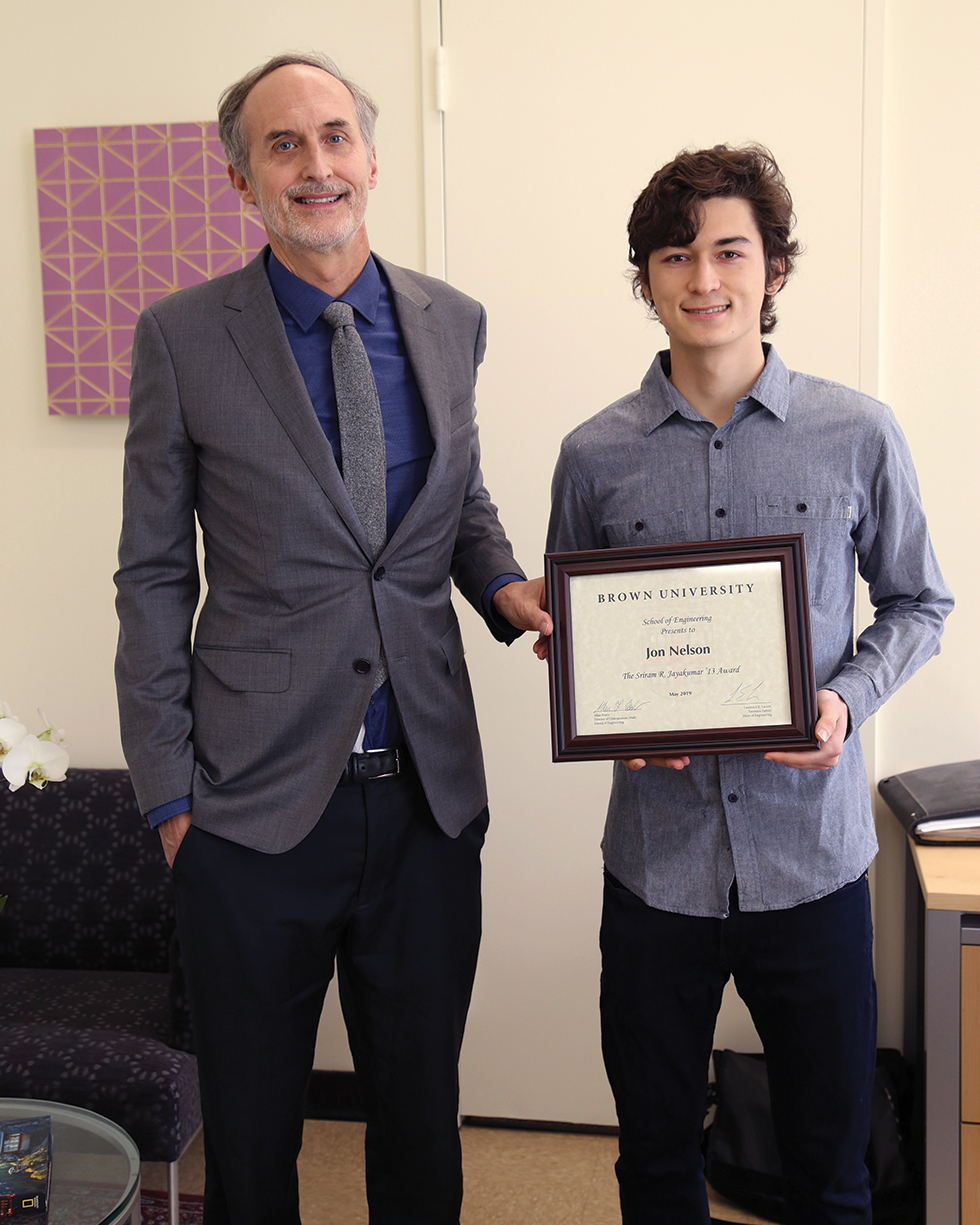Delving into deep learning
Sriram R. Jayakumar ’13 Award allows Jon Nelson ’20 to explore deep learning algorithms for embedded devices.
 Finding his place at Brown has been less of a physical presence or place on a map for Jon Nelson ’20. It has been more of a journey of labs and experiences. From club soccer to the campus piano room, he has orchestrated experiences around campus, finding his cadence in unexpected places.
Finding his place at Brown has been less of a physical presence or place on a map for Jon Nelson ’20. It has been more of a journey of labs and experiences. From club soccer to the campus piano room, he has orchestrated experiences around campus, finding his cadence in unexpected places.
Nelson began by following the counsel of multiple professors. Before his junior year, he approached adviser Jacob Rosenstein to ask about lab research opportunities, ultimately nabbing a stint in Professor Anubhav Tripathi’s lab, and gaining computer engineering experience in a biomedical setting throughout the fall of 2018.
The following spring Nelson enrolled in ENGN1640 Design of Computing Systems, a course he describes as core material for computer engineering. It was here that Professor Sherief Reda took notice of Nelson’s classroom performance, and began to gauge Nelson’s interest in a position in his SCALE (Scalable Energy-Efficient Computing Laboratory) lab. SCALE is known for its novel applications in biometric security, as well as energy efficient processing for embedded deep learning.
With Nelson poised to join the lab, Reda nominated him, and Nelson subsequently won, the Sririm R. Jayakumar ’13 Award, given in memory of Jayakumar to a computer engineering undergraduate to help fund summer research and materials. The award is especially meaningful to Reda, who worked with Jayakumar from his freshman through senior years. “Sriram was a wonderful student, and he won the outstanding senior award in Computer Engineering at his graduation. I enjoyed working with him, and we stayed in touch in his years after Brown. When he passed away, his family decided to make this award, since they knew his research experience was something he cherished.”
Nelson is currently working on a design for an Internet of Things competition, with the aim of classifying activities such sitting, walking up stairs and lying down. This research would be especially beneficial for patients with movement disorders such as Parkinson’s Disease since it would give medical doctors valuable information about the patient’s activity that they would not be able to ascertain from weekly visits. With connected health technology, and real-time data capture and analysis in this area, lies a tremendous potential to improve patient care and treatment.
Thus far, Nelson has been utilizing the lab’s microcontrollers on willing knees and ankles, as he learns to use them. The next step is to develop an embedded lightweight neural network to recognize each of the activities while using the least amount of power and execution time, and he will use the Jayakumar award to help fund this. Implementing such a network on a small piece of hardware is where the SCALE lab excels, and Nelson will look to build on the lab’s previous research with this project.
“I am very honored to have received the Jayakumar award,” he said. “I would not have been able to stay in Providence and take on this project this summer without it.
“This summer made me think more about an academic future – now that I’m seeing professors and graduate students in their day-to-day environment, I’ve become more drawn to this lifestyle.
“Professor Reda’s lab has been doing groundbreaking work in iris scanning and facial recognition. Can we apply similar strategies to gait recognition? Could we not only know if the person is walking or sitting, but who that person is by how they walk? This is the next step after the IoT competition,” Nelson said.
Professor Reda’s lab has been doing groundbreaking work in iris scanning and facial recognition. Can we apply similar strategies to gait recognition? Could we not only know if the person is walking or sitting, but who that person is by how they walk?
Deep learning is is being applied to research problems in almost every field. It is part of the broader field of machine learning, and is a technique for extracting insights from data. It teaches computers to do what comes naturally to humans – learning by example.
“I am excited to delve into that,” Nelson said.
“What I appreciate about Brown engineering is that it’s different than the pre-professional programs at other schools. Here, there is an emphasis on learning for the sake of academic interest, rather than just developing an employable skillset. As a computer engineering student at Brown, I’ve gained skills in programming and hardware design, but I have also developed a fundamental understanding of the electro-magnetic forces I am manipulating when I write code or design on a breadboard. You come out with a lot more knowledge and you appreciate what you’re doing more, when you understand the full context. Brown does not skip corners: It encourages you to learn as much as you can.”